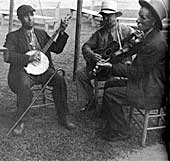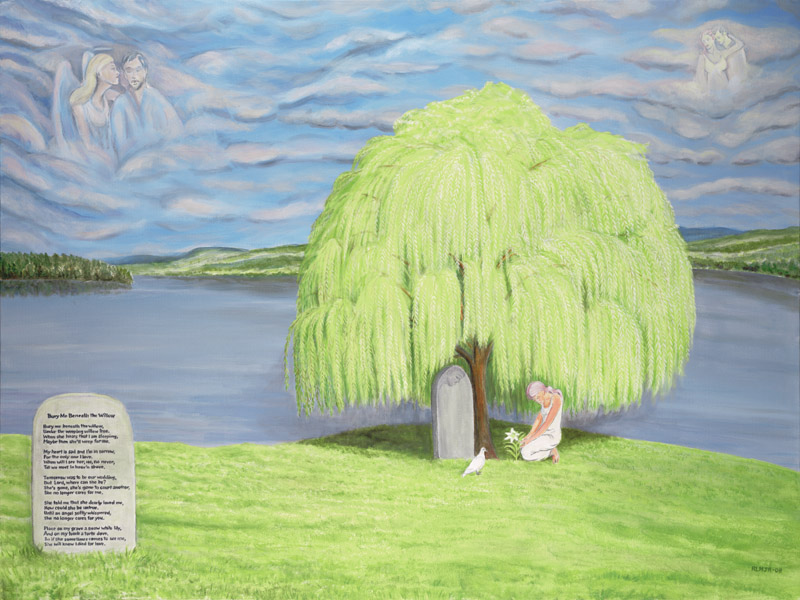 Ernest Thompson Biography
Ernest Thompson Biography
Thompson [Center]
Although Ernest Thompson (1892 – 1961) was not well known and his career lasted but five short years, his repertoire included some important songs that would become country standards largely through his April 1924 recording session. Thompson, who lived in Winston-Salem North Carolina, lost his sight at age 18 in a sawmill accident. Although he attended the State School for the Blind and learned skills commonly taught at the time (piano tuning, broom making), he became most interested in developing his musical skills. Becoming a one-man band adept at 26 different instruments, Thompson performed as a street musician and at dances, building a large repertoire of songs.
Discovered by William Parks, the Atlanta representative for Columbia who was looking for talent in the Winston-Salem area, Thompson went to New York along with Samantha Bumgarner and Eva Davis. On April 25 and April 26 in 1924 he recorded the songs he would be remembered for, most notably "Are You From Dixie?" which became a country standard and is characterized by Thompson's high-pitched singing. Thompson was paid $100 per week plus expenses and was promised a return engagement.
“Are you from Dixie?” a Tin-Pan Alley song by Yellen and Cobb in 1915, was a typical example of the songs Columbia was looking. To promote his records Columbia claimed, “Mr. Thompson has entered 43 contests and had to be satisfied with forty-two first prizes and one second prize. In the latter the winner was a lady who was related to one of the judges. Mr. Thompson has played for ex-Presidents Roosevelt, Taft, Wilson and a host of other National celebrities. ”
 Weeping Willow painting By Richard Matteson
Weeping Willow painting By Richard Matteson
Of his recordings done at that time and a subsequent Sept. 9, 1924 session, his biggest hits were “Whistlin’ Rufus,” backed with “When You’re All In, Down and Out” (also done later by Macon), “Weeping Willow Tree (Bury Me Beneath the Willow)” backed with “Sylvester Johnson Lee” and “Old-Time Religion” backed by “I’m Going Down to Jordon.” Other standards Earnest Thompson first recorded as a country artist were Kerry Mills’ “Red Wing,” W.S. Hays “Life’s Railway To Heaven,” “Snow Deer” “Silly Bill” and “Chicken Roost Behind the Moon.” He also recorded ragtime standard’s like “Alexander’s Ragtime Band,” “At A Georgia Camp Meeting,” and “Thompson’s Old Gray Mule.” The Sept. 10 session was recorded with Connie Sides playing guitar. At A Georgia Camp Meeting and Silly Bill.
His modest record sales prompted Columbia to drop him from their roster. Thompson arranged a 1930 session in Richmond, Indiana with Gennett. They only released two 78’s (four songs) from the 14 sides he recorded. Soon after Thompson returned to relative obscurity. He could be found performing in the streets of Winston-Salem in front of Brown’s Warehouse. He married Cora Lee Pistrollious, also a street performer in 1931 and they moved to Baltimore Maryland. In 1949 the couple moved to nearby High Point, NC where he died in 1961.
Ernest Thompson Recorded Songs: Alexander’s Ragtime Band; Are You from Dixie?; Are You Going To Wet Your Whistle?; At A Georgia Camp Meeting; Chicken Roost Behind the Moon; Climbing Up The Golden Stairs; Don’t Put a Tax on Beautiful Girls; Frankie Baker; Good Old Summertime; How Are You Goin’ To Wet Your Whistle; I’m Going Down to Jordon; In the Baggage Coach Ahead (Baggage Coach Ahead); Jesse James; John Henry (Unissued); Kiss Waltz; Life's Railway to Heaven; Lightning Express; Coon Crap Game; Little Brown Jug; Little Rosebud Casket; Mississippi Dippy-Dip; Mississippi Sawyer; Old Time Religion; Rainbow; Red Wing; Silly Bill; Snow Deer; Sparrow Bird Waltz; Swanee River; Sylvester Johnson Lee; (Jim) Thompson’s Old Gray Mule (Unissued); Weeping Willow Tree (Bury Me Beneath the Willow; When You’re All In, Down and Out; Whistlin’ Rufus; Wreck of the Old Southern 97; Yellow Rose Of Texas (Unissued); Yield Not To Temptation;